Birth
c. 1555
Death
1592
“Moderata Fonte” was the pen name of Modesta Pozzo, the sixteenth-century Venetian writer whose lively and accessible works are infused with an early feminist sensibility that still resonates today. Orphaned as a child, Fonte was educated in her grandmother’s household, where she studied alongside her brother. In 1581 she published the chivalric poem, Tredici canti del Floridoro, followed by other works of poetry and prose. After she married, her literary production slowed, but never ceased. Fonte completed her most influential work shortly before her death in childbirth in 1592: Il merito delle donne (The Worth of Women), a dialogue with a deceptively light touch that confronts the spectrum of obstacles women face in a patriarchal society. The work was published posthumously in 1600 in response to a misogynistic treatise circulating in Venice, The Defects of Women by Giuseppe Passi. Fonte’s firm assertion that women, given the same educational opportunities as men, can succeed equally well at any profession or skill they choose, makes her one of the most important feminist voices of Renaissance Italy.
Personal Information
Name(s):
Moderata Fonte (Modesta Pozzo)
Date and place of birth:
Venice, Italy, 1555
Death and place of death:
Venice, Italy, 1592
Family
Mother:
Marietta del Moro
Father:
Girolamo Pozzo
Marriage and Family Life:
Fonte’s parents were cittadini ordinari, part of the well-off Venetian professional class. Orphaned at a very young age, Fonte lived with her maternal grandmother, Cecilia di Mazzi, and Cecilia’s husband Prospero Saraceni, and later joined the household of her guardian, the writer Giovanni Niccolò Doglioni (1548-1629). In 1583, at the relatively late age of twenty-seven (perhaps owing to a dispute over her inheritance and dowry), she married the lawyer Filippo Zorzi (1558-1598). Fonte had a brother, Leonardo, born in 1533.
Education
Short version:
Fonte received an early education in the convent of Santa Marta before continuing her studies at home. According to Doglioni’s Vita–a short biography of Fonte published as a preface to Il Merito delle donne–she taught herself Latin by having her brother share his lessons with her when he came home from school.
Transformation(s):
Modesta Pozzo published her first work, the chivalric romance Tredici Canti del Floridoro (Thirteen Cantos of Floridoro), in 1581, under the name “Moderata Fonte”–a more elegant version of her given name. Dedicated to the grand duke of Florence, Francesco de’ Medici, and his Venetian bride, Bianca Cappello, Floridoro takes inspiration from Ludovico Ariosto’s influential chivalric poem, Orlando furioso. Fonte infuses this traditionally male literary form with a distinctly feminist sensibility: in Floridoro, female characters (like the warrior Risamante and the enchantress Circetta), are strong, intelligent women and morally above reproach, capable in “arms” as well as “letters.” Canto Four of the Floridoro offers a powerful expression of Renaissance feminism as well as a rebuttal of common Aristotelian tropes about sex and gender:
"Throughout the ages, women have been endowed by Nature with excellent judgement and great courage, and they are born no less well fitted than men to display wisdom and valor, if properly trained and nurtured. And, indeed, if men and women share the same bodily form, if they are composed of like substance, if they eat and speak in the same way, why should they be thought to differ in courage and intelligence?"
For Fonte, the answer is clear: if women have not achieved the same fame and glory as men and in equal numbers, it is only because they have been discouraged from turning their energies “toward heroic and challenging deeds.”
Fonte expanded on similar themes in her later dialogue, The Worth of Women, an important text in the history of feminist thought. Set in an idyllic garden dominated by a statue representing Liberty, the dialogue imagines a conversation among seven friends, each representing a different stage of women’s lives. Their discussion ranges from love and friendship to health and education, questioning how gender norms and social roles impact women’s everyday experience. Fonte’s literary alter ego, the scholarly Corinna, unmarried by choice, often voices the most explicitly feminist perspective. But no matter the topic at hand, all seven women collectively pose questions that steer the discussion to its heart: the oppression of women.
Contemporaneous Network(s):
Fonte’s guardian, Giovanni Niccolò Doglioni, encouraged her literary career and included one of her sonnets in his 1587 treatise, L’anno. Sonnets by Doglioni and other Venetian letterati accompanied her Floridoro of 1581. The dedication of Fonte’s 1582 work Le feste to the doge of Venice suggests that she had gained–or aspired to–entrée at the highest levels of Venetian society. Fonte’s work was known to other women writers in Venice such as Lucrezia Marinella, who directly cites Fonte’s Floridoro in her own feminist treatise, the 1601 The Nobility and Excellence of Women, and the polemical nun Arcangela Tarabotti.
less
Significance
Works/Agency:
In addition to Floridoro and Il Merito delle donne, Fonte was the author of the dramatic dialogue Le feste (1582), and the narrative religious poems, La Passione di Christo (1582) and La resurretione di Christo (1592), both of which include meditations on female protagonists of the Christian tradition. According to Doglioni, who wrote a brief biography of Fonte, she penned “countless sonnets, canzoni, and madrigali,” many of which remain to be identified.
Reputation:
Fonte was well known and respected in her own day, as indicated by Doglioni’s biography of her, published as a preface to Il merito delle donne, and by the mention of her in works by other women writers such as Marinella and Tarabotti. As early as 1583, Fonte’s poetry was included in an anthology put together by Ippolito Zucconello for the king of Poland. The biographer of contemporary women, Cristofano Bronzini, writing in 1625, called Il merito delle donne “a most beautiful and learned text.” In the eighteenth century, Fonte’s poetry was prominently featured in Lusia Bergalli’s important anthology of women writers, Componimenti delle più iullustri rimatrici di ogni secolo (1726).
Legacy and Influence:
Fonte’s dialogue, The Worth of Women, has been published in modern edition and translated into English, German, and French; it has also been staged in dramatic form.
less
Clusters & Search Terms
Current Identification(s):
Italian literature; Renaissance literature; Early Modern Feminism; Venice
Clusters:
Arcangela Tarabotti, Lucrezia Marinella, Veronica Franco, Luisa Bergalli
Search Terms:
Venice; early modern feminism; chivalric poetry; dialogue; Italy
References in existing schemas:
less
Bibliography
Primary (selected):
Bronzini, Cristofano. Della dignità & nobiltà delle donne: dialogo . . . diviso in quattro settimane; e ciascheduna di esse in sei giornate. Florence: Zanobi Pignoni, 1625.
Del giardino de’ poeti in lode del Serenissimo Re di Polonia…Venice: Fratelli Guerri, 1583. In Viridiarium poetarum ... in laudes Serenissimi atque potentissimi D.D. Stephani Regis Poloniae ... in duos libros divisum. Ed. Ippolito Zucconello. Venice, ad Signum Hyppogriphi, 1583.
Fonte, Moderata. Il merito delle donne.Venice: Domenico Imberti, 1600.
------ . Tredici canti del Floridoro. Venice: Francesco Rampazetti, 1581.
------ . Le feste. Venice: Guerra, 1582.
------ . La passione di Christo. Venice: Guerra, 1582.
------ . La resurretione di Christo. Venice:
------ . Tredici canti del Floridoro. Ed. Valeria Finucci. Bologna: Mucchi, 1995.
------ . Il merito delle donne. Ed. Adriana Chemello. Venice: Eidos, 1988.
------ . Floridoro: A Chivalric Romance, trans. Julia Kisacky, ed. Valeria Finucci. Chicago: University of Chicago Press, 2006.
------ . The Worth of Women: Wherein Is Clearly Revealed Their Nobility and Their Superiority to Men, trans. and ed. Virginia Cox. Chicago: University of Chicago Press, 1997.
------ . Das Verdienst der Frauen. Ed. and trans. Daniela Hacke. Munich: CH Beck, 2001.
------ . Le Mérite des femmes. Ed and trans. Frédérique Verrier. Paris, Éditions Rue d'Ulm, 2002.
Archival Resources (selected):
Carinci. Eleonora. 2002. 'Una lettera autografa inedita di Moderata Fonte (al granduca di Toscana Francesco I)'. Critica del testo, 5/3: 1-11.
Web Resources (selected):
Virginia Cox, “On Moderata Fonte’s Feminist Reimagining of 16th-Century Venice: Female Friendships and Single Women in the Merits of Women,” Literary Hub, 27 March 2018, https://lithub.com/on-moderata-fontes-feminist-reimagining-of-16th-century-venice
Images:
Public domain, via Wikimedia Commons: https://en.wikipedia.org/wiki/Moderata_Fonte#/media/File:Moderata_Fonte.png
22.2 First page of a 1581 edition of I Tredici Canti del Floridoro: https://en.wikipedia.org/wiki/Moderata_Fonte#/media/File:1581_Fonte_Cantos.jpg
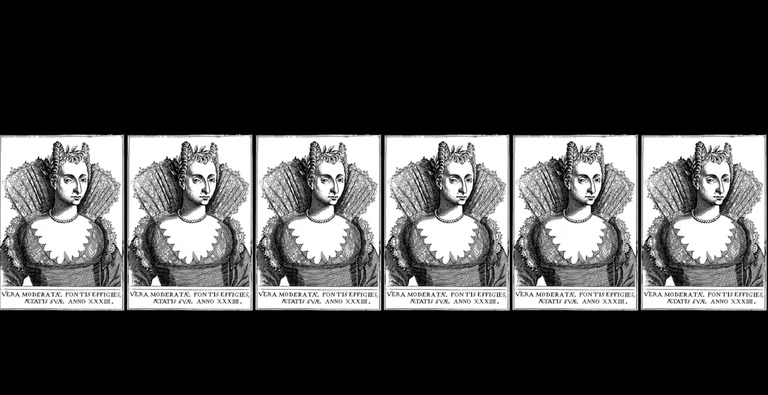
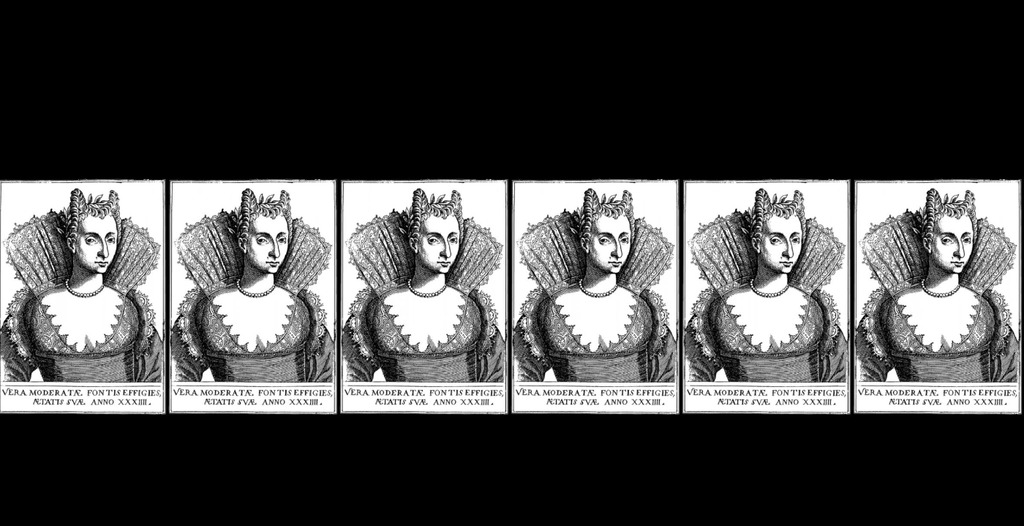
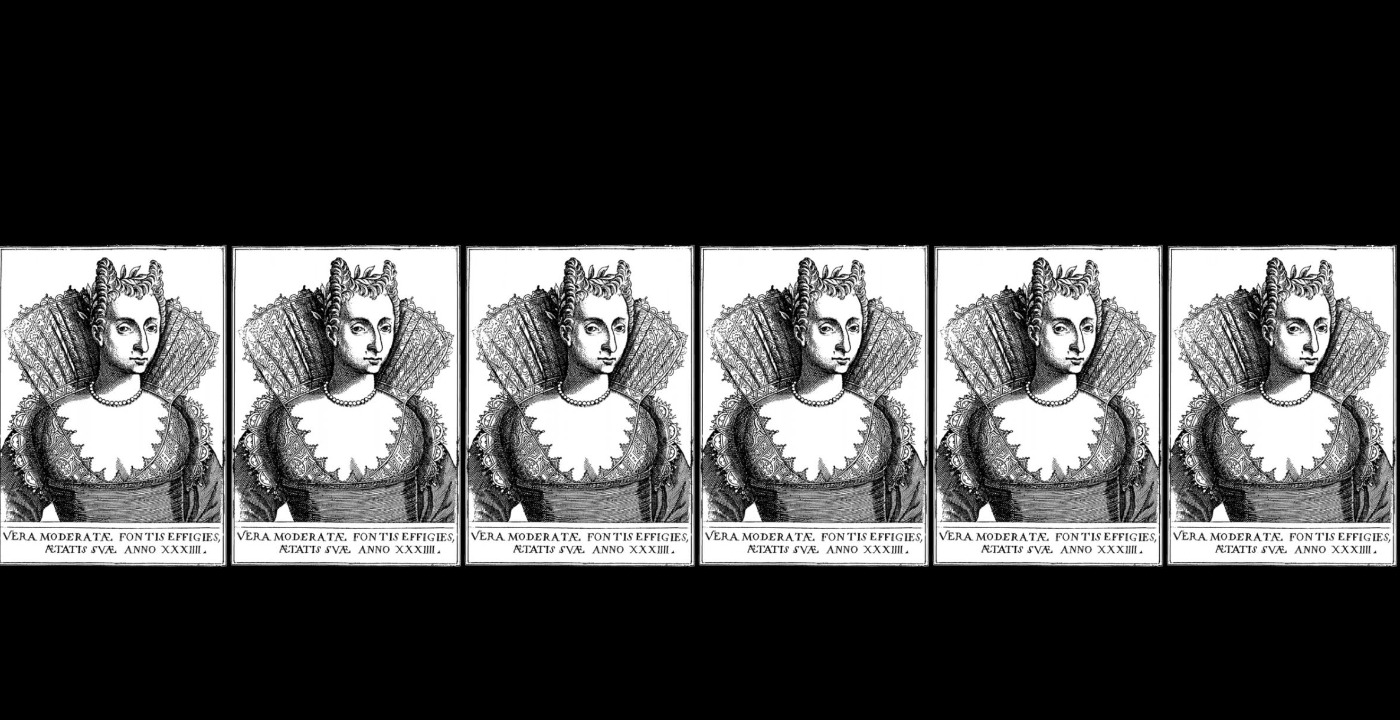
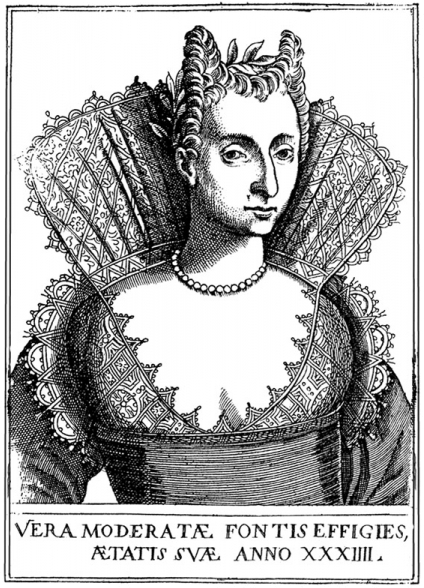
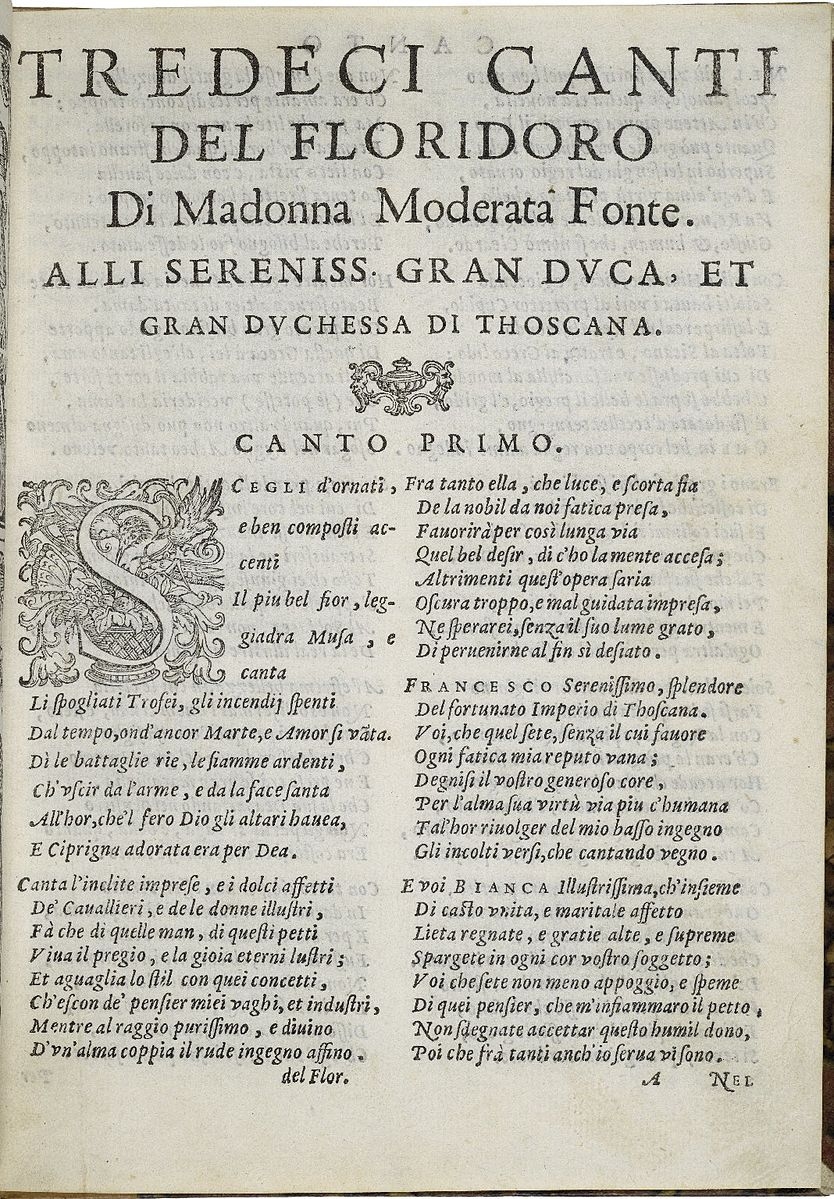
Comment
Your message was sent successfully